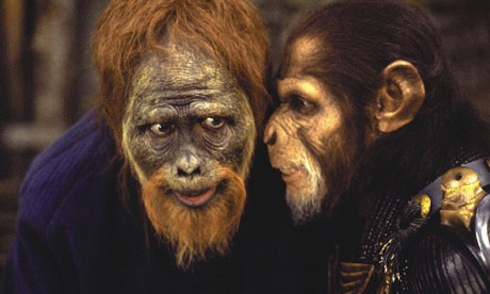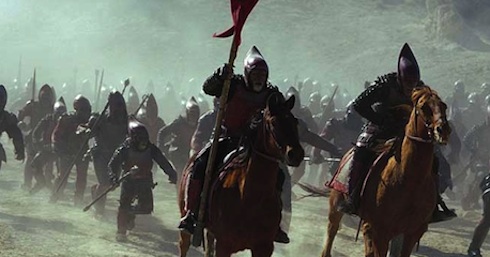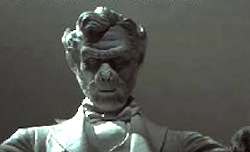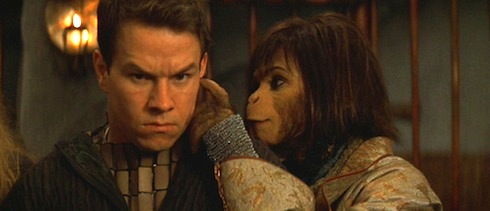Because I haven’t really talked much about the direction on the other Apes films, I want to start off by saying I’m leaving Tim Burton out of this. Tim Burton is such a lightning rod in discussions about Tim Burton that I’d rather not even mention Tim Burton. I’ll call him the Director from this point forward. So, the director aside, what monkeyed up this movie? Everyone always says this movie really, really sucks. Are they right? Yes. But the reasons why it sucks may shock you, because in many ways this Apes film could have been poised to be a great remake.
If I were in a pitch meeting at the studio when this movie was in preproduction, I bet I would have been really excited for a few reasons. First, the planet of the apes in this version is actually a separate alien planet and NOT Earth. Just like the novel. Also, the movie updates the meta-political message from one about slavery to that of animal cruelty, something the previous Apes films alluded to, but never really explored. In this version, there is a human-rights faction of the ape community, which really should have existed in the old version too. Also, the cast is actually pretty good. Tim Roth, Paul Giamatti, Helena Bonham-Carter, David Warner, and sure, Marky Mark. He’s not a terrible actor, and certainly not who I would have picked for the new Heston, but the casting choice isn’t offensive. But, the movie also doesn’t fail because of the direction or the acting, or even the special effects. No. The real culprit here is the writing.

If the weird plot decisions in the old Apes movies seemed outlandish or silly, they did so in a sort of idiot savant way. Sure, it was a series of movies about talking apes and time travel and stuff, but it could be accidentally brilliant, or at the very worst, entertaining in an original way. The 2001 Planet of the Apes isn’t an idiot savant; it’s a drunk pleading for one last happy hour priced drink.
The major mistake here is way the ape culture is depicted in contrast to the humans. The humans in this version can speak, and not only that, speak well. In the original, Heston’s arrival was dangerous because he was a talking human. Marky Mark isn’t really special since he’s just as well spoken as the other humans. The humans are a simply slaves now, which ultimately misses the whole point of how the old Apes films were discussing prejudice. Dr. Zaius was afraid of what Taylor was capable of in the first Apes film because Taylor had intelligence, but also the savagery of humans. Apes don’t kill each other in that reality. In the 2001 Apes, it seems like Apes do kill each other, which is bad for the writing because it doesn’t grant them any kind of moral high ground against the humans. The reason the idea of ape masters was scary in the old movies is because the apes were genuinely more ethical than the humans that they subjugated. The 2001 Apes removes this, and simply makes the apes into villains for the sake of having villains.

These apes also don’t have guns, which was something else that made the old films scary. It clearly showed the apes as civilization, and the humans as brutal animals. This is interesting on a lot of levels, but sticking to the previous point about how “ape shall not kill ape” in the old films, the simple fact that their society has guns is interesting. As savage as the ape culture might seem to us in the classic film, having guns that were ONLY used to hunt “animals” is slightly more evolved than human society. Naturally, the reason why this was scary is because “animals” the apes hunted were humans. However, in the 2001 version, the apes are using spears and knives and rocks. This actually makes them more animalistic, which is a mistake. We don’t want to think of these creatures as the kind of apes we know in real life, but rather as an evolved sort of ape. We likely wouldn’t recognize an evolved ape as being the same kind of creature as a non-intelligent one. This is one reason why the hokey ape-masks from the old films work so well. It’s not supposed to look real.
 I could complain about the time-travel shenanigans and point out that it’s not explained where all the humans came from, but those kinds of complaints wouldn’t be fun because they’re not unique to this movie. All the old Apes movies have problems like that, particularly Battle. Instead, it’s more interesting to hold the 2001 Apes to the standard of the old films, warts and all. What we discover is that thematically, despite their continuity problems or inherent cheesiness, those movies were about something. The 2001 Apes is simply a dull battle and chase sequence with characters we know little about and care about even less. Helena Bonham-Carter might have had more realistic ape make up, but Kim Hunter’s character was real.
I could complain about the time-travel shenanigans and point out that it’s not explained where all the humans came from, but those kinds of complaints wouldn’t be fun because they’re not unique to this movie. All the old Apes movies have problems like that, particularly Battle. Instead, it’s more interesting to hold the 2001 Apes to the standard of the old films, warts and all. What we discover is that thematically, despite their continuity problems or inherent cheesiness, those movies were about something. The 2001 Apes is simply a dull battle and chase sequence with characters we know little about and care about even less. Helena Bonham-Carter might have had more realistic ape make up, but Kim Hunter’s character was real.
You’d have to have a heart of pure evil not to tear-up a little bit when Cornelius and Zira are killed in Escape. But, you’d have also have to be drunk if you were emotionally invested in anything that happens in the 2001 Apes film. So what next? Will James Franco restore our faith that the saga of the apes can again be relevant? In two weeks we’ll see!
Ryan Britt is a staff writer for Tor.com. For the past two weeks he has been dreaming about nothing but apes.










